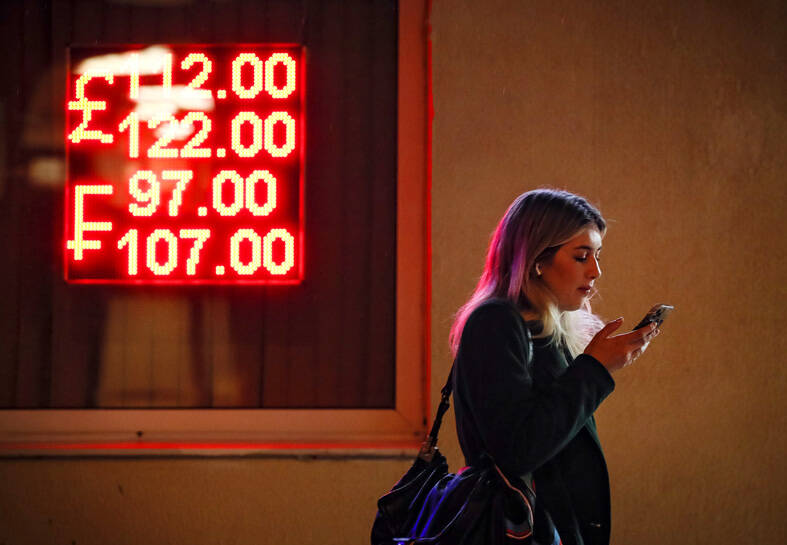ACT QUICKLY
Martyn James, a consumer rights expert, says most scams involve getting you to transfer money directly or obtaining enough personal information to access your bank account, or using private details to start a new account under your name — also known as identity fraud.
If you think you have been scammed, call your bank or card provider to report it immediately.

Photo: Reuters
“The bank and credit card companies all say, weirdly, that lots of people do this very British thing where they feel so foolish, they don’t do anything,” says James. “But there is action you can take, and it all depends on reacting as quickly as possible.”
He advises that you call the main customer phoneline for your bank or card provider.
“Lots of people call the fraud line, but it [often] has lengthy waiting times. It can be hard to reach your provider this way,” James adds.

Photo: EPA-EFE
James says if a large sum is going out in chunks across a period of time, you can halt it. “It is possible a transaction may have been frozen, so even if you have left it for an hour or so, it is still worth reporting it, as your bank may have spotted a pattern and stopped the activity on your account while they work out what is going on.”
CHECK YOUR BANKING APP
A lot of apps offer the option to freeze a card on-line, so if you are worried, you can do this and then talk to your bank.
“You can also report a stolen card on most banking apps,” says Lisa Webb, a consumer law expert at the consumer group Which?.
It is harder to report fraud itself via a banking app, so you may still have to call a number.
“Often, staff on those hotlines are trained to deal with fraud reporting and will know what questions to ask and information to gather,” Webb says. “It’s useful to speak to a human about these things.”
BANKS SHOULD HELP
“If it is not an authorized payment, you can tell them this and you should get your money back,” James says.
Webb adds that if you transfer money to a scammer, your bank is the best place to go first “because an awful lot of banks are signed up to” the voluntary contingent reimbursement model code (CRM Code). She says: “They have to reimburse blameless victims of ‘authorised push payment’ (APP) scams. Unfortunately, we do find that it’s a lottery as to whether a bank reimburses you straight away. It is down to the reference of being blameless, as some banks have a higher threshold.”
James says adds that if you have accidentally handed over your banking passcodes, it can sometimes be more difficult, so if you realize this may have happened, check for any unusual transactions.
CHECK YOUR CREDIT RATING
James says the worst and most frustrating situation is when data is scraped and used to commit identity fraud. He adds that this is not very common but, when it does happen, it can be “devastating.”
To avoid this, you should be careful with personal details, especially anything sent over e-mail. For example, people often send themselves copies of their passport with the subject line “passport.”
A scammer who has your e-mail access codes can then get this document relatively easily, and see all of the personal details it contains.
“Something practical to do is search for and delete e-mails like this,” says James.
If you suspect you may have had personal details stolen, you should keep an eye on your credit file using a credit reference agency. These agencies have online guides on ID theft, and Citizens Advice also has good information.
“It’s a case of being vigilant and checking credit-rating Web sites to see what crops up and any debts that you are registered against. A statutory credit report is free,” says James. “If your identity has been stolen, it should be confirmed by those Web sites. Any financial borrowing or activity along those lines will appear in a credit file linked to you.”
REPORT FRAUD TO PREVENT IT
Webb says you can report fraud in England, Wales and Northern Ireland to Action Fraud or, if you are in Scotland, to the police.
“If you are dealing with a situation such as purchase fraud — for example, someone is selling something dodgy — you can also go to Trading Standards, which can take enforcement action against retailers,” she says.
Webb says you should never feel embarrassed, though this is quite a common response.
“It’s important to talk to payment providers … or even family, as being scammed has a huge psychological impact, and affects people’s ability to trust.”
She advises going to the police and your bank if personal information has been taken in case someone tries to clone your card.
CHANGE YOUR LOGINS
“If you have data stolen or copied, then change all your online passwords — that is key,” Webb says. “If someone gets hold of a few bits of information, they can use it in ways you might not expect.”

Every now and then, it’s nice to just point somewhere on a map and head out with no plan. In Taiwan, where convenience reigns, food options are plentiful and people are generally friendly and helpful, this type of trip is that much easier to pull off. One day last November, a spur-of-the-moment day hike in the hills of Chiayi County turned into a surprisingly memorable experience that impressed on me once again how fortunate we all are to call this island home. The scenery I walked through that day — a mix of forest and farms reaching up into the clouds

With one week left until election day, the drama is high in the race for the Chinese Nationalist Party (KMT) chair. The race is still potentially wide open between the three frontrunners. The most accurate poll is done by Apollo Survey & Research Co (艾普羅民調公司), which was conducted a week and a half ago with two-thirds of the respondents party members, who are the only ones eligible to vote. For details on the candidates, check the Oct. 4 edition of this column, “A look at the KMT chair candidates” on page 12. The popular frontrunner was 56-year-old Cheng Li-wun (鄭麗文)

“How China Threatens to Force Taiwan Into a Total Blackout” screamed a Wall Street Journal (WSJ) headline last week, yet another of the endless clickbait examples of the energy threat via blockade that doesn’t exist. Since the headline is recycled, I will recycle the rebuttal: once industrial power demand collapses (there’s a blockade so trade is gone, remember?) “a handful of shops and factories could run for months on coal and renewables, as Ko Yun-ling (柯昀伶) and Chao Chia-wei (趙家緯) pointed out in a piece at Taiwan Insight earlier this year.” Sadly, the existence of these facts will not stop the

Oct. 13 to Oct. 19 When ordered to resign from her teaching position in June 1928 due to her husband’s anti-colonial activities, Lin Shih-hao (林氏好) refused to back down. The next day, she still showed up at Tainan Second Preschool, where she was warned that she would be fired if she didn’t comply. Lin continued to ignore the orders and was eventually let go without severance — even losing her pay for that month. Rather than despairing, she found a non-government job and even joined her husband Lu Ping-ting’s (盧丙丁) non-violent resistance and labor rights movements. When the government’s 1931 crackdown